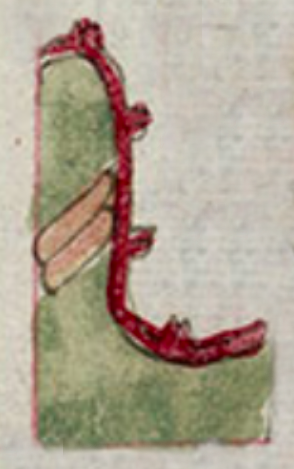Ocotepec (CST32)
This painting of the compound glyph for the place name Ocotepec (“On the Hill of Pines’) half of a hill sign (tepetl, hill or mountain), with the locative -c implied. The hill is painted a mottled green. The outer edge is a red border with four little protruding stones (tetl) that provide the phonetic indicator that tepetl starts with te-. The stones, of course, can also be semantic, for most hills or mountains have stones in or on them. In the middle of the hill are two pieces of torch pine wood (ocotl). The companion text states that Ocotepec will be the source of some wooden beams or planks (huapalli), which are also shown on this page.
Stephanie Wood
For more on the Codex Sierra, see Kevin Terraciano’s study (2021), with a transcription of the Nahuatl and an English translation (pp. 120 and 155).
Stephanie Wood
1550–1564
Jeff Haskett-Wood
madera, ocotes, cerros, montañas, nombres de lugares

oco(tl), pine fatwood, https://nahuatl.wired-humanities.org/content/ocotl
-tepec, on the hill or mountain, https://nahuatl.wired-humanities.org/content/tepec
Cerro de los Pinos
Stephanie Wood
Códice Sierra-Texupan, plate 32, page dated 1560. Origin: Santa Catalina Texupan, Mixteca Alta, State of Oaxaca. Kevin Terraciano has published an outstanding study of this manuscript (Codex Sierra, 2021), and in his book he refers to alphabetic and “pictorial” writing, not hieroglyphic writing. We are still counting some of the imagery from this source as hieroglyphic writing, but we are also including examples of “iconography” where the images verge on European style illustrations or scenes showing activities. We have this iconography category so that such images can be fruitfully compared with hieroglyphs. Hieroglyphic writing was evolving as a result of the influence of European illustrations, and even alphabetic writing impacted it.
https://bidilaf.buap.mx/objeto.xql?id=48281&busqueda=Texupan&action=search
The Biblioteca Digital Lafragua of the Biblioteca Histórica José María Lafragua in Puebla, Mexico, publishes this Códice Sierra-Texupan, 1550–1564 (62pp., 30.7 x 21.8 cm.), referring to it as being in the “Public Domain.” This image is published here under a Creative Commons license, asking that you cite the Biblioteca Digital Lafragua and this Visual Lexicon of Aztec Hieroglyphs.





